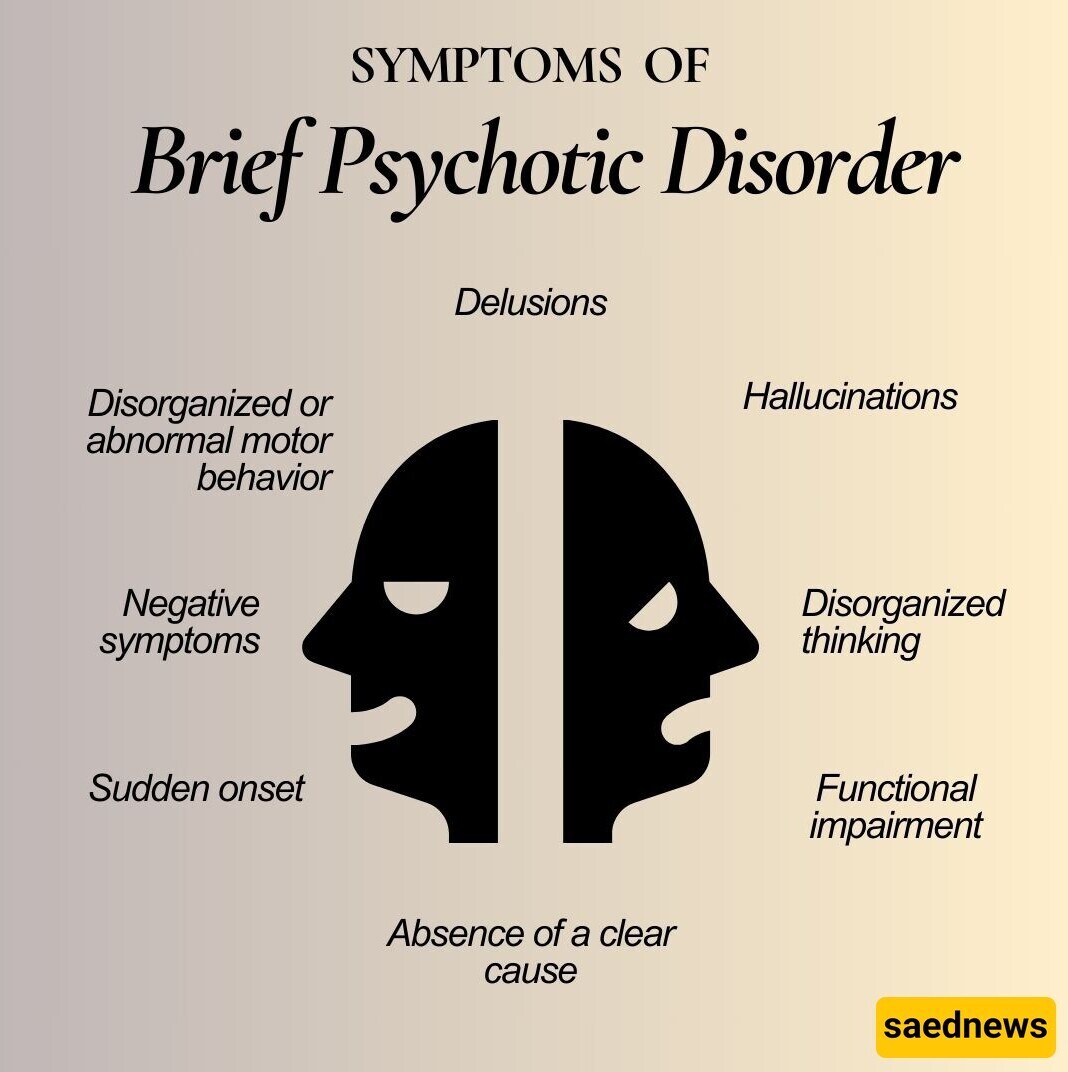SAEDNEWS: Psychotic disorders are a group of serious mental health conditions characterized by abnormal thoughts and perceptions that do not align with reality.

According to SAEDNEWS, psychotic disorders, or psychosis, affect the brain by altering thoughts, beliefs, or perceptions. Individuals with psychotic disorders may become convinced that someone is spying on them or following them, hear voices, or feel as though others are manipulating their thoughts. They struggle to distinguish their perceptions from reality.
The symptoms of a psychotic disorder can appear gradually or suddenly. The period during which individuals experience these symptoms is known as a "psychotic episode," during which the person loses contact with reality. Psychosis affects thoughts, emotions, feelings, and behavior.In this article, we will explore this mental disorder in detail and the symptoms it includes. Disturbing emotions can disrupt life, so it’s advisable to consult with a psychologist or psychiatrist about these issues.
Delusions (false beliefs) and hallucinations (false perceptions) are also key features. Treatment of psychotic disorders is often carried out with both medication and non-medication therapies.


Psychotic disorders, or psychosis, are a group of serious conditions that affect the mind. They make it difficult for individuals to think clearly, make correct judgments, have appropriate emotional responses, communicate effectively, understand reality, and behave in a socially acceptable manner. When symptoms are severe, individuals with psychotic disorders have trouble connecting with reality and often find it difficult to manage daily life.
Text in English: Psychotic disorders are severe mental disorders that cause abnormal thinking and perceptions. People with psychoses lose touch with reality.
Translation: Psychotic disorders are severe mental conditions that lead to abnormal thinking and perception. Individuals with psychosis lose their connection to reality.

Psychotic disorders vary in type based on the severity of symptoms, the types of symptoms a person experiences, and other factors. The main types of psychotic disorders include:
Brief Psychotic Disorder
Substance or Alcohol-Induced Psychosis
Schizophrenia
Delusional Disorder
Schizoaffective Disorder
Schizophreniform Disorder
Shared Psychotic Disorder
Psychosis Due to Another Medical Condition
Paraphrenia
Each of these disorders has its own specific symptoms. The last one, paraphrenia, is a condition that exhibits symptoms similar to schizophrenia or delusional disorder but is not yet officially recognized as a psychotic disorder in DSM-5. This condition often begins in older adults, especially when various neurological problems arise. Let’s now look at some of these disorders and their symptoms.
Disorder | Description | Symptoms |
Schizophrenia | A chronic brain disorder affecting thoughts, feelings, and behaviors. | Hallucinations, delusions, disorganized speech, erratic behavior, loss of interest or motivation, memory and concentration problems. |
Bipolar Disorder | A mood disorder characterized by extreme mood swings. | Mania (elevated mood, high energy, racing thoughts, insomnia, increased activity), Depression (low mood, lack of energy, negative thoughts, fatigue, sleep problems). |
Schizoaffective Disorder | A condition that includes symptoms of both schizophrenia and mood disorders (such as depression or bipolar disorder). | Hallucinations, paranoia, delusions, severe mood changes. |
Delusional Disorder | Characterized by having persistent, false beliefs that are not based on reality. | Paranoia, delusions of persecution, jealousy, or grandeur. |

Brief Psychotic Disorder – A short-lived psychosis that often follows highly stressful events such as a death in the family. Recovery is often quick.
Substance-Induced Psychosis – Occurs due to the use or withdrawal from substances such as drugs and alcohol.
Organic Psychosis – A type of psychosis that results from physical damage to the brain, such as from a stroke or infection.
Postpartum Psychosis – A rare form of psychosis that can occur after childbirth, often presenting with symptoms of both depression and mania.
Severe Depression with Psychotic Features – Individuals with severe depression may also experience psychotic symptoms, including delusions and hallucinations.
Bipolar Psychosis – Psychosis that occurs during extreme mood swings, especially during manic or depressive episodes.

Symptoms of Psychotic Disorders (Psychotic Symptoms): Symptoms can vary depending on the specific disorder but commonly include:
Hallucinations (seeing or hearing things that are not there)
Delusions (strong beliefs that are not based on reality)
Disorganized speech or thinking
Social withdrawal
Neglect of personal hygiene
Paranoia
Extreme changes in behavior and appearance
Causes of Psychotic Disorders: The exact cause of psychosis is unknown, but genetic factors, brain chemistry imbalances, traumatic events, substance abuse, and certain health conditions can play a role. Neurotransmitter imbalances, such as in dopamine, serotonin, or glutamate, have been implicated in psychotic disorders.
Who Is At Risk for Psychosis? People who experience significant stress, depression, or have a family history of mental illness are more likely to develop psychotic disorders. Additional risk factors include:
Alzheimer’s disease and other dementias
Hormonal conditions such as Addison’s disease and Cushing’s disease
Brain infections
Vitamin B1 and B12 deficiencies
History of substance abuse or severe brain injury
High levels of stress and anxiety
Diagnosis of Psychotic Disorders: Doctors diagnose psychotic disorders by reviewing a patient's medical and psychiatric history, conducting physical exams, and sometimes performing blood tests or brain imaging to rule out other conditions.
Treatment of Psychotic Disorders: Treatment depends on the cause, type, and severity of the psychosis. Medications, such as antipsychotics, antidepressants, or mood stabilizers, are commonly prescribed. Cognitive-behavioral therapy (CBT) is also often used. In cases of severe symptoms, hospitalization may be necessary.
Complications of Psychotic Disorders: Psychosis can severely affect an individual’s life, leading to social and professional impairment, and sometimes causing harm to themselves or others. Treatment and support are essential to help manage these challenges.

